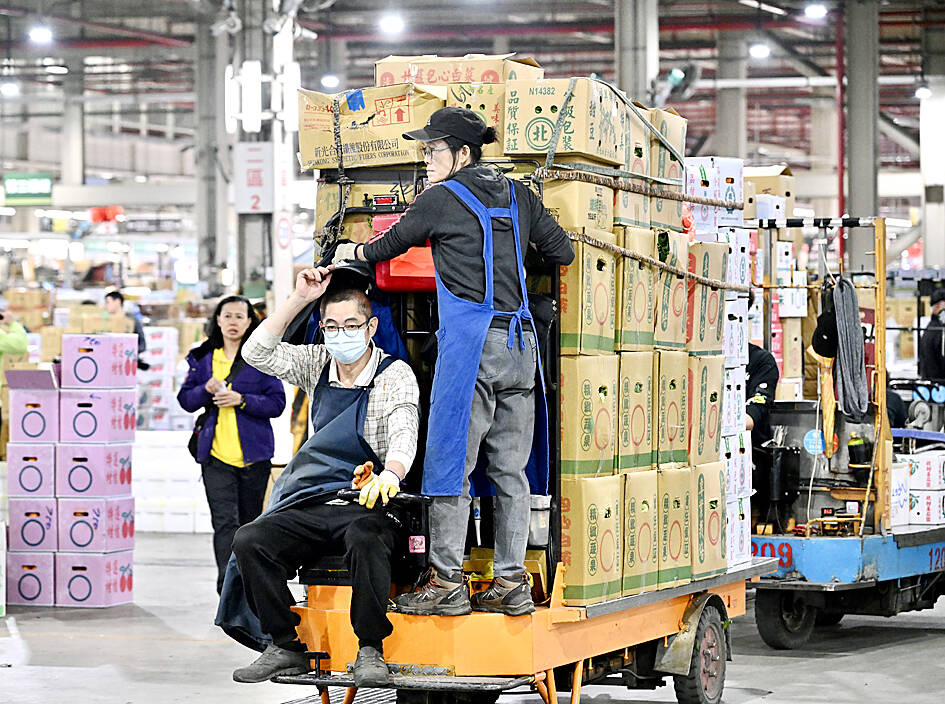Taiwan’s manufacturing purchasing managers’ index (PMI) last month fell 2.1 percent to 48.7, ending two months of expansion weighed by the effect of the Lunar New Year holiday and uncertainty linked to the US’ potential tariff hikes, the Chung-Hua Institution for Economic Research (CIER, 中華經濟研究院) said yesterday.
However, the reading on the six-month business outlook gained 5.6 points back into growth mode at 51.7, encouraged by China’s stimulus measure for purchases of smartphones, tablets and wearables.
“Taiwan should come up with measures to address its trade surpluses with the US, which amounted to US$70 billion last year, a 50 percent spike from a year earlier,” CIER president Lien Hsien-ming (連賢明) said.

Photo: Peter Lo, Taipei Times
US President Donald Trump has reiterated his displeasure with the US’ trade imbalances with other countries and has threated to impose tariffs of up to 100 percent on semiconductors, Lien said.
It is unclear if Trump would levy tariffs on advanced chips or all chips and whether he is targeting consumer products or intermediate goods, he said.
Tariffs on intermediate goods would harm Taiwanese firms, because many make electronic components used in artificial intelligence systems, smartphones, notebook computers and other technology applications, Lien said.
The critical sub-index on new business orders shed 1.2 points to 49.7, while the gauge on industrial production tumbled 7.1 points to 45, the Taipei-based think tank found.
PMI measures seek to capture the manufacturing industry’s health, with scores of 50 and higher indicating expansion and values below the threshold suggesting contraction.
The latest retreat had much to do with the week-long Lunar New Year holiday, Lien said.
Likewise, the measure on inventories added an insignificant 0.8 points to 46.5, while customers’ inventories lost 0.9 points to 45.3, both reflecting a conservative business approach, the CIER said.
Whatever the final tariff outcome is, Taiwan should be braced for unfavorable trade terms under the Trump administration, Lien said.
Nevertheless, local firms displayed positive views about their business six months forward after China introduced a 15 percent subsidy for purchases of consumer technology products, the institute said.
The positive outlook came also because the survey took place before Trump announced 25 percent tariffs on imports from Canada and Mexico, it said, adding that the US is set to raise tariffs on steel imports later this month.
The PMI survey this month might shed a different light on the industry’s business sentiment, Lien said.
The non-manufacturing PMI last month weakened 1.5 points to 55, staying in expansion mode for the 27th consecutive month, as the holiday season provided a boost to all service sectors despite rising operating costs and service charges, the institute said.
Non-manufacturers are looking at a business slowdown, given the six-month business outlook gauge softened 0.9 points to 49.6, the first contraction sign since November 2023, with the poor sentiment showing among retailers, wholesale operators and real-estate brokers, it said.

SEMICONDUCTORS: The German laser and plasma generator company will expand its local services as its specialized offerings support Taiwan’s semiconductor industries Trumpf SE + Co KG, a global leader in supplying laser technology and plasma generators used in chip production, is expanding its investments in Taiwan in an effort to deeply integrate into the global semiconductor supply chain in the pursuit of growth. The company, headquartered in Ditzingen, Germany, has invested significantly in a newly inaugurated regional technical center for plasma generators in Taoyuan, its latest expansion in Taiwan after being engaged in various industries for more than 25 years. The center, the first of its kind Trumpf built outside Germany, aims to serve customers from Taiwan, Japan, Southeast Asia and South Korea,

Gasoline and diesel prices at domestic fuel stations are to fall NT$0.2 per liter this week, down for a second consecutive week, CPC Corp, Taiwan (台灣中油) and Formosa Petrochemical Corp (台塑石化) announced yesterday. Effective today, gasoline prices at CPC and Formosa stations are to drop to NT$26.4, NT$27.9 and NT$29.9 per liter for 92, 95 and 98-octane unleaded gasoline respectively, the companies said in separate statements. The price of premium diesel is to fall to NT$24.8 per liter at CPC stations and NT$24.6 at Formosa pumps, they said. The price adjustments came even as international crude oil prices rose last week, as traders

POWERING UP: PSUs for AI servers made up about 50% of Delta’s total server PSU revenue during the first three quarters of last year, the company said Power supply and electronic components maker Delta Electronics Inc (台達電) reported record-high revenue of NT$161.61 billion (US$5.11 billion) for last quarter and said it remains positive about this quarter. Last quarter’s figure was up 7.6 percent from the previous quarter and 41.51 percent higher than a year earlier, and largely in line with Yuanta Securities Investment Consulting Co’s (元大投顧) forecast of NT$160 billion. Delta’s annual revenue last year rose 31.76 percent year-on-year to NT$554.89 billion, also a record high for the company. Its strong performance reflected continued demand for high-performance power solutions and advanced liquid-cooling products used in artificial intelligence (AI) data centers,

SIZE MATTERS: TSMC started phasing out 8-inch wafer production last year, while Samsung is more aggressively retiring 8-inch capacity, TrendForce said Chipmakers are expected to raise prices of 8-inch wafers by up to 20 percent this year on concern over supply constraints as major contract chipmakers Taiwan Semiconductor Manufacturing Co (TSMC, 台積電) and Samsung Electronics Co gradually retire less advanced wafer capacity, TrendForce Corp (集邦科技) said yesterday. It is the first significant across-the-board price hike since a global semiconductor correction in 2023, the Taipei-based market researcher said in a report. Global 8-inch wafer capacity slid 0.3 percent year-on-year last year, although 8-inch wafer prices still hovered at relatively stable levels throughout the year, TrendForce said. The downward trend is expected to continue this year,